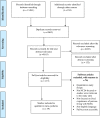How chronic conditions are understood, experienced and managed within African communities in Europe, North America and Australia: A synthesis of qualitative studies
- PMID: 36791113
- PMCID: PMC9931108
- DOI: 10.1371/journal.pone.0277325
How chronic conditions are understood, experienced and managed within African communities in Europe, North America and Australia: A synthesis of qualitative studies
Abstract
This review focuses on the lived experiences of chronic conditions among African communities in the Global North, focusing on established immigrant communities as well as recent immigrant, refugee, and asylum-seeking communities. We conducted a systematic and narrative synthesis of qualitative studies published from inception to 2022, following a search from nine databases-MEDLINE, EMBASE, PsycINFO, Web of Science, Social Science Citation Index, Academic Search Complete, CINAHL, SCOPUS and AMED. 39 articles reporting 32 qualitative studies were included in the synthesis. The studies were conducted in 10 countries (Australia, Canada, Denmark, France, Netherlands, Norway, Sweden, Switzerland, United Kingdom, and the United States) and focused on 748 participants from 27 African countries living with eight conditions: type 2 diabetes, hypertension, prostate cancer, sickle cell disease, chronic hepatitis, chronic pain, musculoskeletal orders and mental health conditions. The majority of participants believed chronic conditions to be lifelong, requiring complex interventions. Chronic illness impacted several domains of everyday life-physical, sexual, psycho-emotional, social, and economic. Participants managed their illness using biomedical management, traditional medical treatment and faith-based coping, in isolation or combination. In a number of studies, participants took 'therapeutic journeys'-which involved navigating illness action at home and abroad, with the support of transnational therapy networks. Multi-level barriers to healthcare were reported across the majority of studies: these included individual (changing food habits), social (stigma) and structural (healthcare disparities). We outline methodological and interpretive limitations, such as limited engagement with multi-ethnic and intergenerational differences. However, the studies provide an important insights on a much-ignored area that intersects healthcare for African communities in the Global North and medical pluralism on the continent; they also raise important conceptual, methodological and policy challenges for national health programmes on healthcare disparities.
Copyright: © 2023 de-Graft Aikins et al. This is an open access article distributed under the terms of the Creative Commons Attribution License, which permits unrestricted use, distribution, and reproduction in any medium, provided the original author and source are credited.
Conflict of interest statement
The authors have declared that no competing interests exist.
Figures
References
-
- World Health Organzation. Noncommunicable diseases 2021.
-
- Agyemang C, Nyaaba G, Beune E, Meeks K, Owusu-Dabo E, Addo J, et al.. Variations in hypertension awareness, treatment, and control among Ghanaian migrants living in Amsterdam, Berlin, London, and nonmigrant Ghanaians living in rural and urban Ghana-the RODAM study. J Hypertens 2017;36:169–77. 10.1097/HJH.0000000000001520. - DOI - PubMed
-
- Malfatti G. People-Centered Approaches toward the Internationalization of Higher Education. University of Missouri, USA; 2020.
-
- Braff L, Nelson K. The Global North: Introducing the Region. In: Fernandez N, Nelson K, editors. Gendered Lives: Global Issues, Albany: State University of New York Press; 2022.
Publication types
MeSH terms
LinkOut - more resources
Full Text Sources
Medical


